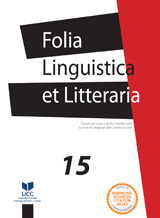Defining and Undefining Home and Family Space in Louis de Berniere’s Novel Birds Without Wings
Defining and Undefining Home and Family Space in Louis de Berniere’s Novel Birds Without Wings
Author(s): Sandra JosipovićSubject(s): Theory of Literature
Published by: Filološki fakultet, Nikšić
Keywords: guest; host; arrivant; conditional hospitality; absolute hospitality; language of hospitality
Summary/Abstract: The paper deals with Louis de Bernières’ novel Birds Without Wings in view of Derrida’s concept of the arrivant and his concept of hospitality. In this novel, both Christians and Muslims live side by side in harmony in the town of Eskibahçe until the war comes. They are both guests and hosts who show hospitality to each other by going to each other’s homes: the imam’s wife is friendly with a Christian woman, a beautiful Christian girl is in love with a Muslim goatherd. Derrida argues that the arrivant can surprise the host enough to jeopardize the very border that determines the host’s legitimate home, the door and threshold of his home and that is what happens in the novel. Those, who are both hosts and guests to each other, become involved in the devastating conflict during the First World War which leads to the expulsion of the Turkish Christians to Greece and to the evacuation of the Greek Muslims to Turkey. Before the war, the inhabitants of this small town live in some kind of liminal space, somewhere in between Turkish and Greek culture. Since the word liminal comes from the Latin word limin which means threshold, it brings us back to Derrida’s concept of the guest, i.e. the arrivant who crosses the threshold of his host’s home and who can jeopardize the borders of that home, thus creating a conflict.
Journal: Folia Linguistica et Litteraria
- Issue Year: 2016
- Issue No: 15
- Page Range: 69-79
- Page Count: 11
- Language: English

